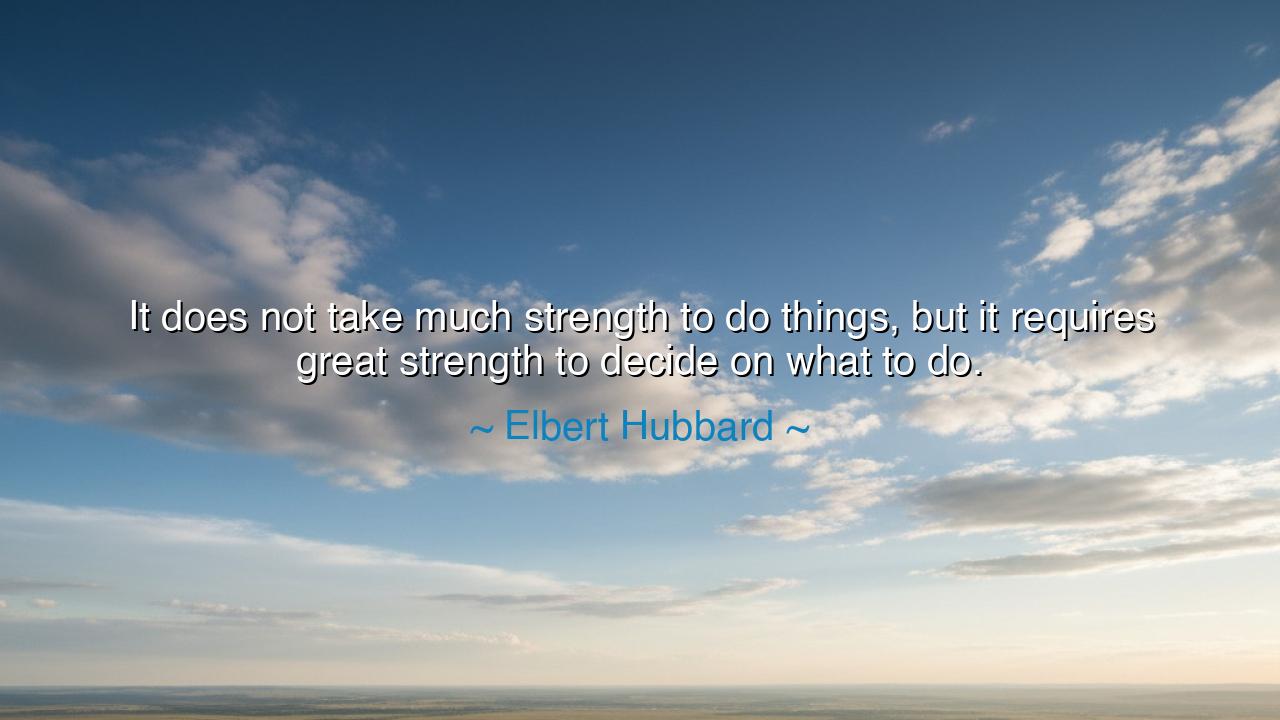
It does not take much strength to do things, but it requires
It does not take much strength to do things, but it requires great strength to decide on what to do.






“It does not take much strength to do things, but it requires great strength to decide on what to do.” Thus spoke Elbert Hubbard, the American sage of craft and thought, a man who shaped both words and wood into works of lasting meaning. His saying cuts deep into the heart of human struggle, revealing that the hardest labor is not of the hands, but of the mind and spirit. For the world is filled with those who act swiftly, yet few who act wisely. To move is easy — to move rightly is divine. Hubbard teaches that true strength lies not in motion, but in decision, not in force, but in clarity of purpose.
Elbert Hubbard lived in an age of restless industry — the dawn of the twentieth century — when machines roared and progress surged forward without pause. Yet amidst this storm of action, he perceived a deeper crisis: that man, though powerful in deed, had grown weak in direction. His words, written in that era of invention, speak to all ages, warning that the might of muscle or intellect is wasted if not guided by the compass of conviction. To do is the work of the many; to choose what to do is the burden of the great.
For indeed, the act of decision demands the highest courage. The warrior must not only wield the sword, but choose his battle; the artist must not only paint, but choose his vision; the leader must not only command, but choose his cause. Once a path is chosen, strength flows naturally — but before that choice, the soul stands trembling before the vastness of possibility. This is the secret hardship of life: the moment of decision, when one must silence fear, desire, and doubt, and listen for the still voice of truth. To reach that voice — to know one’s purpose — requires the greatest power of all: inner strength.
Consider the story of Mahatma Gandhi, who faced the might of an empire not with weapons, but with will. When India was chained under British rule, many urged rebellion by blood and blade. Yet Gandhi, in the quiet furnace of conscience, made his choice — nonviolence, a weapon forged of spirit, not steel. The decision cost him friends, comfort, and peace. It demanded strength beyond measure — for to stand alone in one’s conviction is a heavier labor than any act of force. Yet from that single decision flowed a river of action that reshaped the world. Truly, as Hubbard said, the doing was simple; the deciding was monumental.
This truth is mirrored in every realm of life. The builder may raise a city, but without vision, his towers are hollow. The scholar may gather knowledge, but without purpose, it becomes noise. Even in the small moments of daily living — when one must choose honesty over ease, kindness over pride, or patience over anger — the test is not in the doing, but in the choosing. The strength of character is forged in those silent inner battles where no applause is heard and no eye bears witness.
Hubbard’s wisdom also reminds us that indecision is a quiet destroyer. The soul that cannot choose drifts like a ship without a rudder — moved by every current, but going nowhere. To live without decision is to live without destiny. Yet he does not scorn hesitation, for he knew that true decision requires reflection and courage. The weak act in haste; the strong wait until their purpose burns clear within them, then act with the full power of conviction. Thus, he teaches us that strength is not the speed of our hands, but the steadfastness of our heart.
Therefore, O seeker of truth, learn this sacred art: before you act, decide well. Withdraw into the quiet of your soul and ask, “What is right, what is true, what is worthy of my effort?” Once you have answered, move forward without fear. For strength spent without wisdom is wasted, but strength guided by decision becomes a force that shapes the world. Let every action spring from deliberate purpose, and your life, though simple in deed, shall be profound in meaning.
So remember, as Hubbard wrote: “It does not take much strength to do things, but it requires great strength to decide on what to do.” Do not be proud of your busyness, but of your direction. Do not seek to do much, but to do what matters. The greatest strength is not in the hands that labor, nor in the tongue that speaks, but in the soul that chooses rightly. For from one right decision may flow a lifetime of noble deeds, and from one clear purpose, the power to move mountains.






AAdministratorAdministrator
Welcome, honored guests. Please leave a comment, we will respond soon